Finding the right packaging supplier isn’t just about price and delivery speed. When you’re in specialized industries like food or cosmetics, your packaging needs are unique and often regulated.
Industry-specific packaging suppliers possess sector-tailored certifications, processes, materials expertise and regulatory know-how that general suppliers lack. Use structured research, credential verification and a weighted comparison matrix to pinpoint partners that meet the unique safety, compliance and branding demands of your products.
Ready to discover how to identify the perfect packaging partner for your business? Let’s dive deeper.
Table of Contents
ToggleWhat Makes Industry-Specific Packaging Suppliers Different from General Suppliers?
Understanding why specialization matters can save you from costly mistakes and regulatory headaches later.
Industry-specific suppliers hold mandated certifications like FSSC 22000 for food or ISO 22716 for cosmetics, possess validated materials science knowledge, and maintain lower risk profiles through audited hygiene and traceability systems that general suppliers often lack.
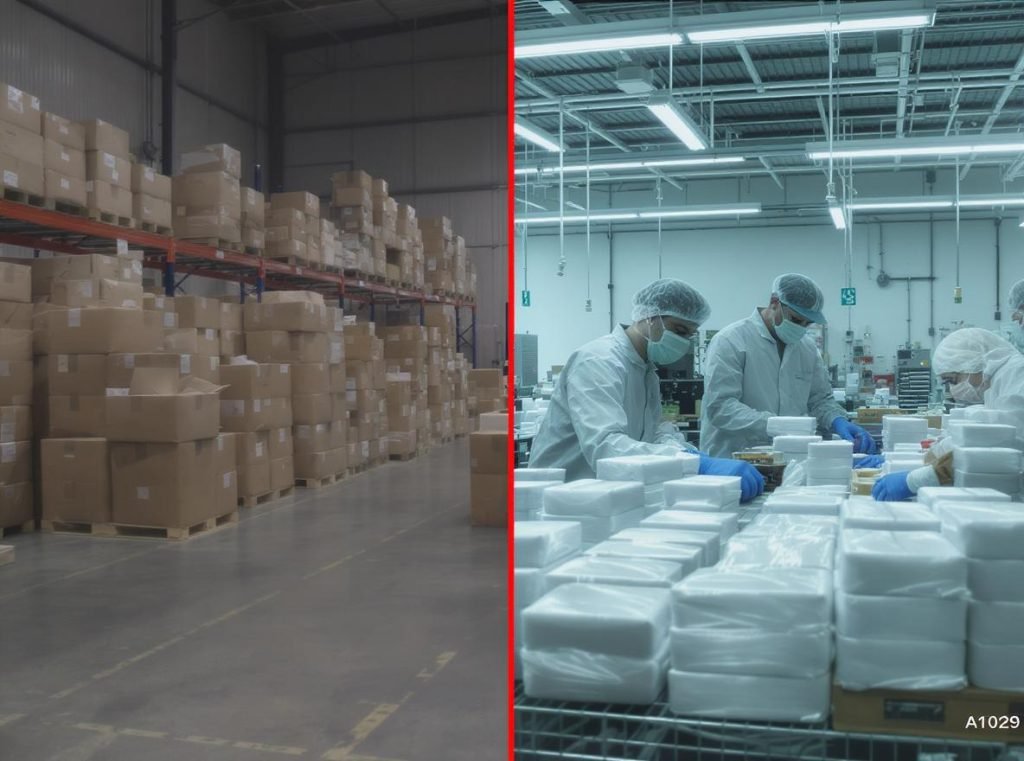
Key Differentiators of Specialized Suppliers
The gap between specialized and general suppliers extends far beyond basic manufacturing capabilities.
Regulatory Expertise
Specialized suppliers stay current with evolving requirements like FDA 21 CFR parts 170-199 for food-contact materials, EU Framework Reg. 1935/2004, and the new MoCRA requirements for cosmetics. They understand HACCP protocols and maintain compliance documentation that general suppliers may not even know exists.
Material Science Mastery
Industry specialists use validated resins, inks, and coatings specifically tested to prevent migration or allergen cross-contact. They understand barrier properties, oxygen transmission rates, and chemical compatibility testing that protects your products and consumers.
Built-in Testing Capabilities
Rather than outsourcing critical tests, specialized suppliers often maintain in-house facilities for shelf-life studies, migration testing, stress-crack analysis, and seal-integrity protocols specific to your product category.
| Dimension | Industry-Specific Supplier | General Supplier |
|---|---|---|
| Core Focus | Narrow sector expertise (food-contact, cosmetic-grade) | Broad mix of markets |
| Certifications | FSSC 22000, SQF, ISO 22716, BRCGS | Often only ISO 9001 or none |
| Risk Profile | Lower: audited for hygiene, traceability, GMP | Higher compliance risk |
| Testing | Built-in protocols for target products | Often outsourced |
How Do You Research and Identify Industry-Specific Suppliers?
The research phase determines whether you’ll find a true partner or just another vendor who claims expertise.
Start with validated directories like Thomasnet filtered by specific certifications, leverage trade shows with PACK Match consultations, and consult industry associations for pre-vetted member directories. University extension centers and raw-material vendors often maintain updated supplier lists.

Strategic Research Approaches
Your supplier search strategy should tap into industry-specific resources that general searches miss.
Validated Directory Searches
Thomasnet allows filtering by specific certifications like “SQF, BRCGS, FSSC 22000” for food suppliers or “ISO 22716-certified packaging” for cosmetics. This pre-qualification saves significant screening time.
Trade Show Intelligence
Pack Expo, Cosmoprof, and SupplySide West offer PACK Match consultation services that provide tailored lists of exhibitors matching your specific requirements. Book these consultations to access curated supplier recommendations.
Industry Association Resources
- Flexible Packaging Association member directories
- Independent Cosmetic Manufacturers and Distributors supplier lists
- Cornell Food Venture Center’s updated packaging-supplier database
- GFSI benchmarked certification holder databases
Expert Network Referrals
Raw-material vendors (resin, pigment, additive suppliers) often know converters with the right compliance profiles. These referrals come pre-qualified through existing business relationships.
What Specific Qualifications Should You Look for in Food Packaging Suppliers?
Food packaging regulations are among the strictest in any industry, making supplier qualifications critical for market access and consumer safety.
Food packaging suppliers must hold Global Food Safety Initiative (GFSI) benchmarked certifications like FSSC 22000, BRCGS Packaging Materials Issue 7, or SQF Edition 9. They need validated material compliance with FDA 21 CFR parts 170-199 and EU Framework Reg. 1935/2004, plus migration testing capabilities.
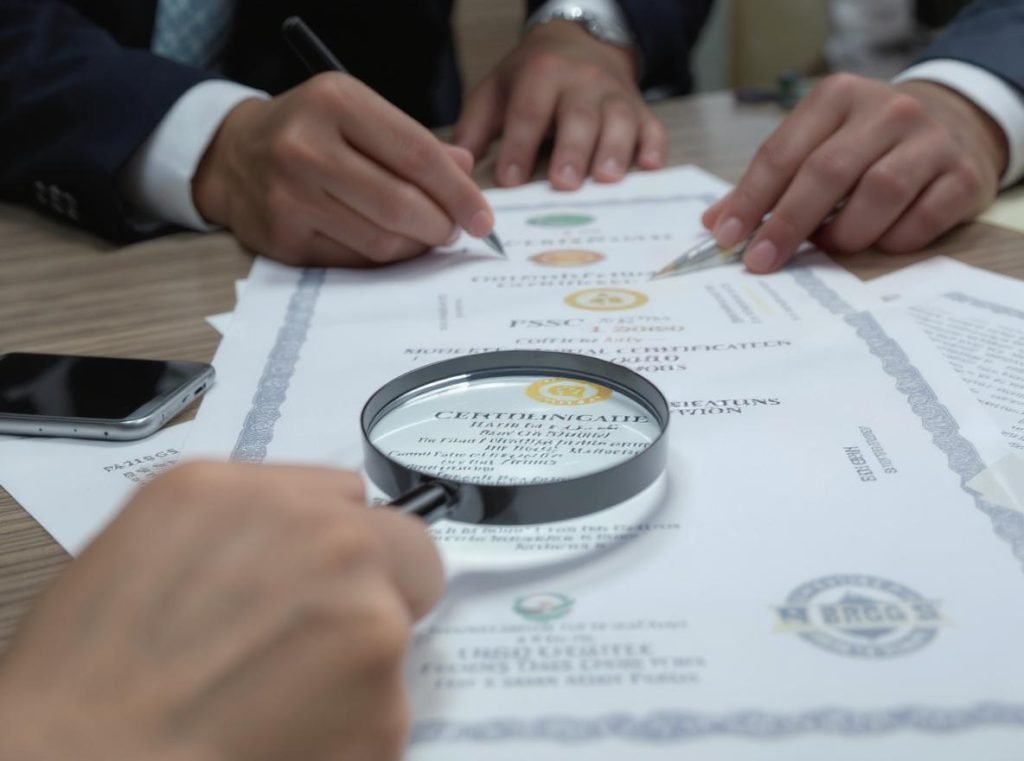
Essential Food Packaging Qualifications
These qualifications are mandatory rather than preferred for food packaging suppliers.
GFSI Benchmarked Certifications
FSSC 22000 combines ISO 22000 Food Safety Management with additional prerequisite programs specific to food packaging. BRCGS Packaging Materials Issue 7 provides comprehensive quality and safety management. SQF Edition 9 for packaging ensures international food safety standards compliance.
Regulatory Compliance Documentation
- FDA 21 CFR parts 170-199 compliance certificates
- EU Framework Reg. 1935/2004 documentation
- Migration testing certificates proving barrier integrity
- cGMP and HACCP programs audited by SGS, NSF, or similar bodies
Operational Excellence Indicators
Look for suppliers with third-party audit summaries showing minimal non-conformities, inline vision systems for quality control, and established corrective action procedures with documented turnaround times.
| Certification | Purpose | Global Recognition |
|---|---|---|
| FSSC 22000 | Food safety management for packaging | GFSI benchmarked |
| BRCGS Packaging | Quality and safety standards | Retailer accepted |
| SQF Edition 9 | Comprehensive food safety | International standard |
What Should You Evaluate When Choosing Cosmetic Packaging Suppliers?
Cosmetic packaging combines strict safety requirements with brand presentation demands, requiring suppliers with dual expertise.
Cosmetic packaging suppliers should hold ISO 22716 (Cosmetic GMP) certification, demonstrate MoCRA readiness for US markets, provide material compatibility and migration data, and offer sustainability credentials like FSC/PEFC or ISCC PLUS certifications.
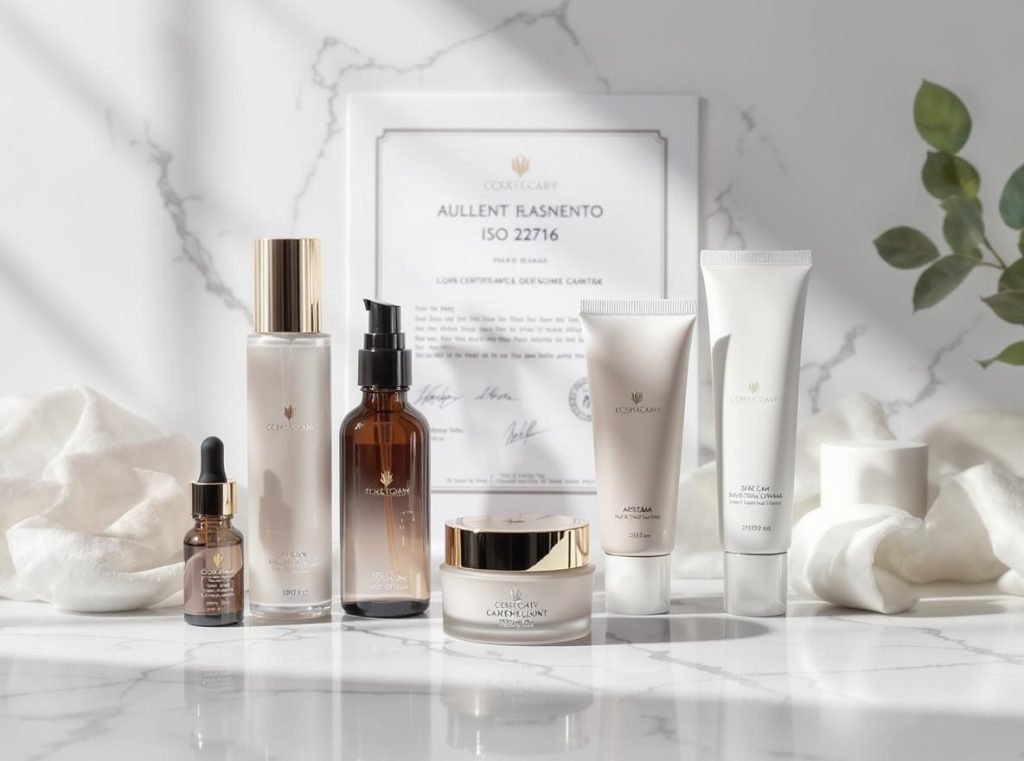
Cosmetic-Specific Evaluation Criteria
The cosmetic industry’s unique challenges require suppliers with specialized knowledge and regulatory awareness.
Mandatory Certifications and Compliance
ISO 22716 (Cosmetic GMP) certification represents the core global standard for cosmetic manufacturing and packaging safety. MoCRA readiness ensures FDA facility registration and product listing for US market access.
Technical Capabilities Assessment
- Material compatibility and migration testing data
- Decoration durability and environmental testing results
- Sustainability credentials (FSC/PEFC paperboard, ISCC PLUS recycled resins)
- Social and ethical audit certifications (SA8000, Sedex SMETA)
Operational Flexibility Factors
Evaluate minimum order quantities, tooling flexibility for launches and line extensions, scalability plans as volumes increase, and digital traceability options like QR codes or RFID integration.
Innovation and Design Support
Modern cosmetic packaging increasingly demands sustainable solutions and premium aesthetics. Assess suppliers’ experience with recyclable materials, refillable systems, and advanced decoration techniques.
How Do You Verify a Supplier’s Industry Experience and Credentials?
Verification prevents costly partnerships with unqualified suppliers who may promise more than they can deliver.
Cross-check certificate numbers on scheme owner websites (FSSC, BRCGS, ISO), request third-party audit summaries from the last two years, speak with current brand owner references in your product category, and conduct capacity tours focusing on hygiene zones and quality systems.
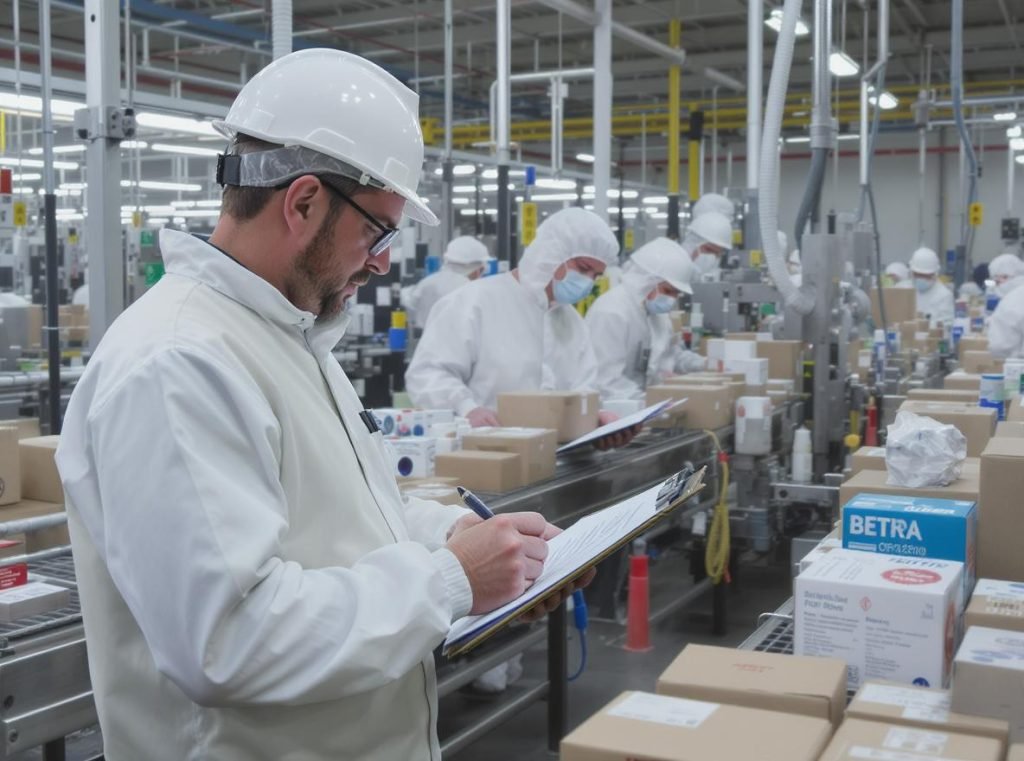
Comprehensive Verification Process
Thorough verification protects your business from compliance issues and supply chain disruptions.
Certificate Authenticity Checks
Verify certificate numbers directly on certification body websites. Check expiration dates and scope coverage to ensure certifications apply to your specific product category and manufacturing processes.
Audit Trail Documentation
- Last two third-party audit summaries showing non-conformities and corrective actions
- FDA 483 or EU authority inspection findings for the facility
- Client defect rate data and on-time delivery performance metrics
- Change control procedures for ink, resin, or liner specifications
Reference Verification Process
Contact at least two current brand owners in your product category. Ask specific questions about defect rates (measured in parts per million), delivery reliability, responsiveness to quality issues, and technical support quality.
Financial and Operational Stability
- Dun & Bradstreet reports or audited financial statements
- Business continuity plans for raw-material shortages
- Capacity utilization and scalability assessments
- Insurance coverage adequacy for your risk profile
What Questions Should You Ask Potential Industry-Specific Suppliers?
The right questions reveal whether suppliers truly understand your industry’s unique requirements and operational challenges.
Ask about specific GFSI or ISO schemes covering their facility, testing schedules for your substrate, corrective action turnaround times, change control procedures, and detailed case studies in your product segment showing cost, lead-time, and shelf-life outcomes.

Critical Supplier Questions by Category
These questions help you evaluate suppliers beyond basic manufacturing capabilities.
Certification and Compliance Questions
- Which GFSI or ISO schemes cover this site and when is the next surveillance audit?
- Describe your foreign material and migration testing schedule for our substrate
- How do you manage change control for ink, resin, or liner specifications?
- What is your regulatory inspection history with FDA or EU authorities?
Operational Excellence Questions
- What is your corrective-action turnaround time for packaging defects?
- Provide three project case studies in my product segment showing outcomes
- Detail minimum order quantities, tooling costs, and scalability plans
- Explain your business continuity plan for supply disruptions
Innovation and Sustainability Questions
- Outline your sustainability roadmap: recycled content targets, carbon accounting
- What digital traceability or serialization options can you embed?
- How do you support clients during product development phases?
- What testing capabilities do you maintain in-house versus outsourced?
How Do You Compare and Evaluate Multiple Industry-Specific Suppliers?
Effective comparison requires a structured approach that weighs both quantitative metrics and qualitative factors important to your business success.
Create a weighted scoring matrix that evaluates certifications (25%), quality KPIs like defect rates (15%), cost competitiveness (15%), lead-time reliability (10%), innovation capabilities (10%), sustainability credentials (10%), financial stability (5%), and service quality (10%) to objectively compare suppliers.
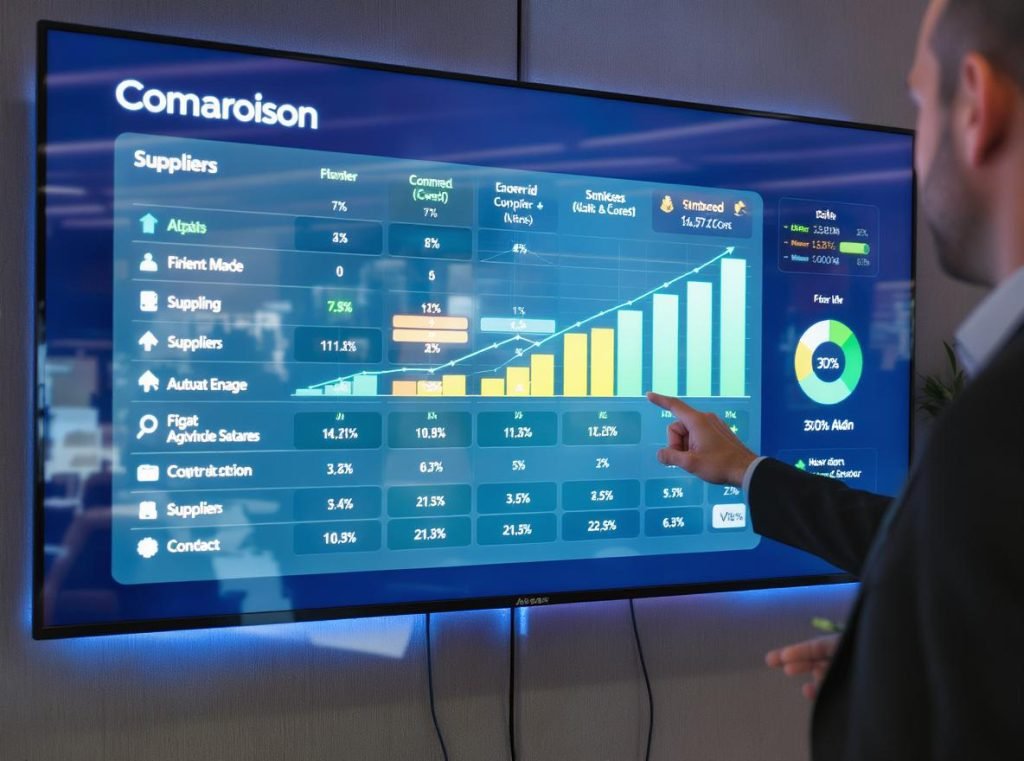
Structured Supplier Comparison Framework
A systematic scoring approach prevents subjective decisions that could impact long-term business success.
Weighted Matrix Development
Assign weights based on your business priorities. Technical capabilities and certifications typically carry the highest weights, followed by cost and reliability factors.
Quantitative Performance Metrics
- Defect rates measured in parts per million (ppm)
- On-time-in-full (OTIF) delivery percentages
- Cost per thousand units including tooling amortization
- Lead-time consistency and reliability tracking
- Financial stability ratings from credit agencies
Qualitative Assessment Factors
Service quality includes communication responsiveness, technical support depth, problem-solving approach, and partnership attitude. Innovation capabilities encompass decoration options, sustainable material expertise, and development support.
| Criterion (Weight) | Supplier A Score | Supplier B Score | Supplier C Score |
|---|---|---|---|
| Certifications (25%) | FSSC 22000 + BRCGS (25) | ISO 22000 (18) | None (0) |
| Quality – defect ppm (15%) | 150 ppm (12) | 220 ppm (8) | 600 ppm (2) |
| Cost per 1,000 units (15%) | $0.032 (13) | $0.030 (15) | $0.028 (14) |
| OTIF delivery (10%) | 97% (10) | 88% (7) | 80% (5) |
| Innovation options (10%) | High (10) | Medium (7) | Low (4) |
| Sustainability (10%) | ISCC PLUS + FSC (10) | FSC only (6) | None (0) |
What Is the Step-by-Step Process for Sourcing Industry-Specific Suppliers?
A systematic sourcing process ensures you don’t overlook critical factors while maintaining efficiency in supplier selection.
Follow a ten-step roadmap: define requirements, build a long-list via validated directories, screen by certifications, issue detailed RFQs, conduct paper audits, perform on-site inspections, score using weighted matrices, run pilot tests, negotiate service agreements, and establish annual review processes with alternate supplier qualification.
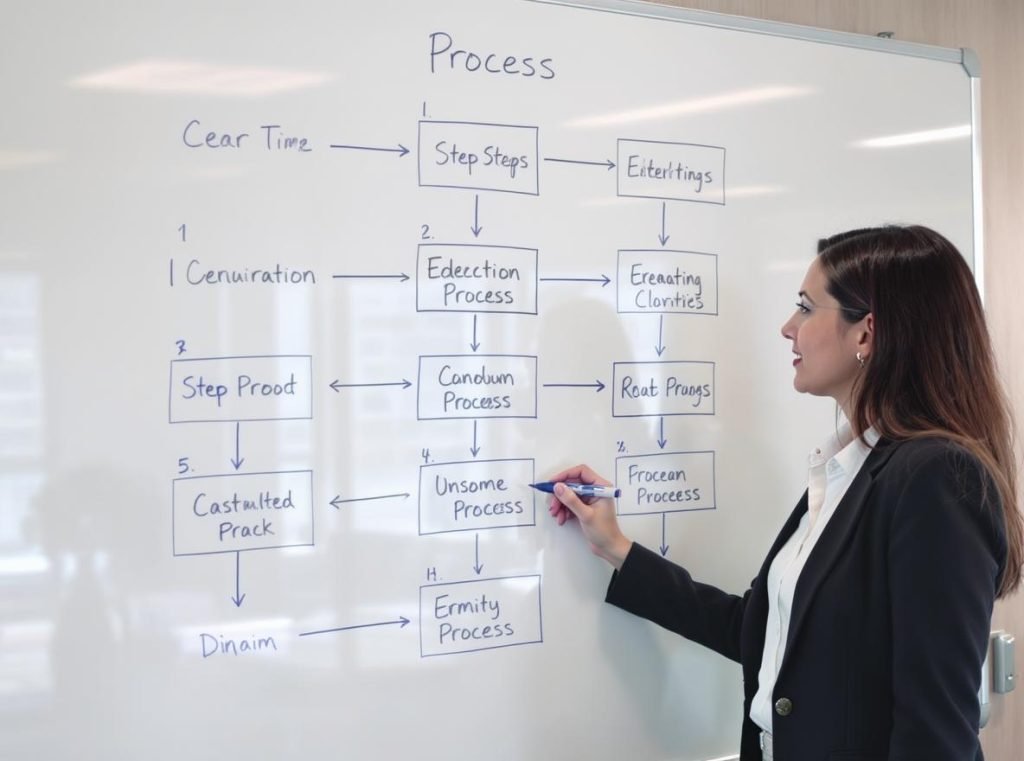
Complete Sourcing Roadmap
This structured approach minimizes risk while maximizing supplier partnership potential.
Planning and Research Phase
- Define regulatory, functional, volume, and sustainability requirements
- Build comprehensive supplier long-lists via directories, trade shows, associations
- Screen candidates by mandatory certifications to eliminate non-compliant providers
- Issue detailed RFQs with specification sheets and volume forecasts
Evaluation and Selection Phase
- Conduct paper audits reviewing certificates and QA procedures
- Perform on-site or remote audits focusing on hygiene, GMP, and testing capabilities
- Score suppliers using weighted comparison matrices
- Run pilot productions to validate machinability and shelf-life performance
Partnership Establishment Phase
Negotiate service level agreements including quality KPIs, continuous improvement clauses, and performance metrics. Establish annual review schedules and maintain at least one qualified alternate supplier for supply chain risk mitigation.
Ongoing Management Practices
Regular performance reviews, certification status monitoring, and market scanning for new technology or regulatory changes ensure your supplier relationships remain optimized for business growth.
Summary
Finding the right industry-specific packaging supplier requires systematic research through validated directories and trade associations, thorough credential verification including certificate authenticity and audit histories, and structured evaluation using weighted scoring matrices that balance technical capabilities with business partnership potential.

Ready to find your ideal packaging partner? Contact Acreet today for customized packaging solutions that meet your industry’s unique regulatory demands and quality standards.
Get Expert Industry-Specific Packaging Solutions
At Acreet, we understand that different industries require specialized packaging expertise. Our team holds relevant certifications and maintains deep knowledge of food safety standards, cosmetic regulations, and sustainable packaging innovations. Whether you need FDA-compliant food packaging, ISO 22716-certified cosmetic containers, or sustainable packaging solutions, we provide the specialized expertise your business demands. Contact us today to discuss your specific industry requirements and discover how our custom packaging solutions can help your products succeed in competitive markets.


